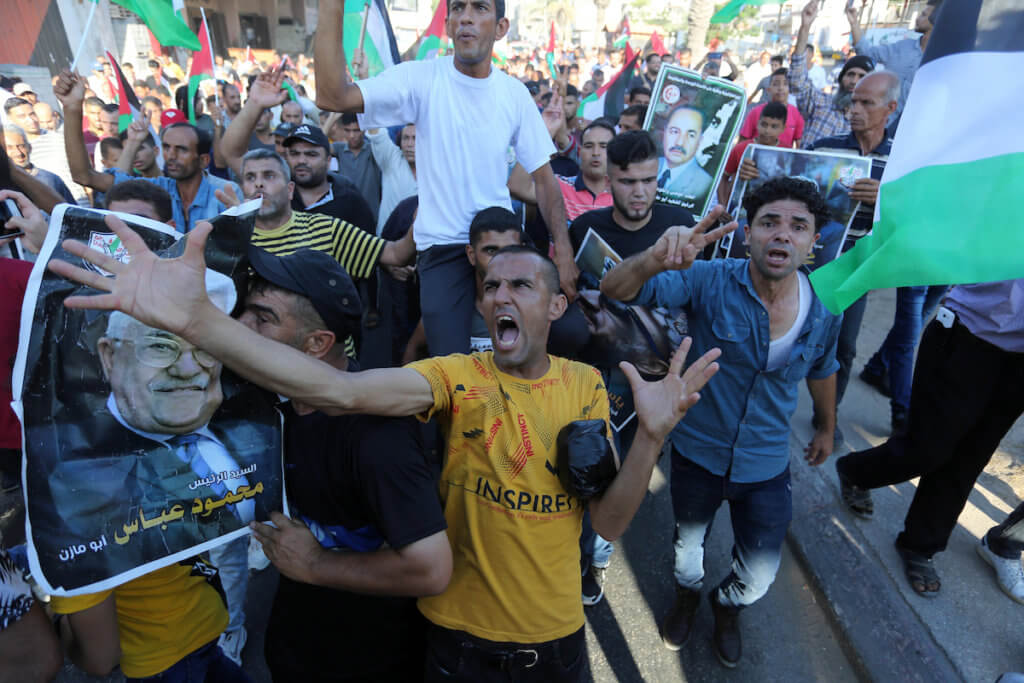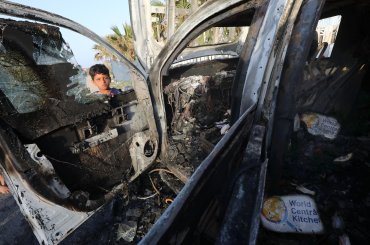Welcome to the Health and Human Rights Media Watch. During the coronavirus pandemic, we are curating a weekly timeline/update on the impact of the virus on Israel/Palestine and all related submissions to Media Watch will be folded into that report. Please follow at more here. Health and human rights news unrelated to the pandemic is included.
The resurgence of COVID-19
The virus has come back to the West Bank and Gaza with a vengeance. Over 24 hours 272 new cases of the virus have been confirmed in the occupied West Bank, East Jerusalem and the Gaza Strip. This time the epicenter is in Hebron with 90% of cases occurring there. Trailing behind Hebron is Nablus in the Northern West Bank. Most of the new cases have been traced back to Palestinian laborers who work in Israel. Districts have been left open to one another with people traveling between cities unhindered setting up a situation of greater public health risk in Palestine.
And here is the monthly Media Watch:
Society is unwell. The symptoms—racialized violence, and excess morbidity and mortality in minority ethnic populations—reflect the cause: an unjust and unequal society. Scientists and doctors, by remaining technocratic and apolitical, are complicit in perpetuating discrimination. As a health community, we must do more than simply describing inequities in silos, we must act to dismantle systems that perpetuate the multiple intersecting and compounding systems of oppression that give rise to such inequities and injustices. To this end, we are producing a series of academic papers to centre the complex challenges of racism and xenophobia in the health discourse. We are working with a diverse team of academics and activists globally to highlight injustices, identify solutions, and enact change. Read more in the Lancet.
Palestine
See below the long-awaited publication of the special issue of The International Journal of Applied Psychoanalytic Studies devoted to Palestine, edited by USA Palestine Mental Health Network Advisory Council member Martin Kemp.
Here are separate links to all of the contents of the June10, 2020 special issue of the International Journal of Applied Psychoanalytic Studies:
- Editor’s introduction by M. Kemp
- Research paper by M. Kemp
- Research paper by N. Shalhoub-Kevorkian
- Research paper by A. Otman
- Research paper by D. Harrold
- Research paper by S. Sheehi and L. Sheehi
- Research paper by E. Berger and S. Jabr
These links are online for the public to view. When a person goes to the page provided through each link, the person will see the abstract of each paper. They will also see several options to purchase the entire paper. There is also an option for academics to freely access the entire paper through the special code or institutional credentials which have been provided to faculty members of universities. Contact the author for a PDF of entire articles–it is my understanding that authors are permitted to send colleagues individual copies for personal use.
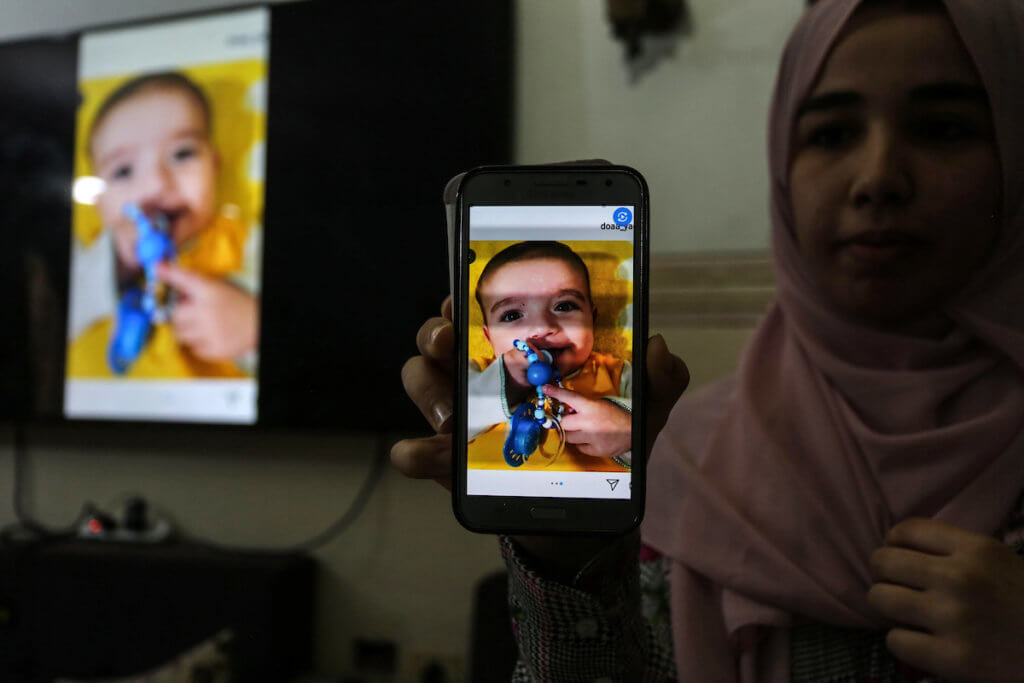
Gaza
During the last 10 to 15 years, thousands of civilian Palestinians in Gaza have survived numerous military incursions, but with war-related traumatic injuries caused by explosive weapons. It is unclear to which extent the injuries sustained by such modern weaponry may increase survivors’ risks of negative long-term health effects and serious illness. Among the same amputees, subgroups of patients presented a variety of alarming symptoms and findings. Nearly half had remaining metal fragments from explosives of unknown composition harbored in various parts of their bodies. All patients identified with lesions and nodules are being followed up locally. As of now, we cannot anticipate the long-term health consequences of living with metal residuals from modern explosive weapons embedded in body organs and tissue. From the British Medical Journal Open
The effects of blockade, poverty, and frequent attacks suffered by the population have taken a significant toll on people’s mental health. The Great March of Return, a mass resistance movement begun in March 2018, initially provided a positive impact on community mental health via a sense of agency, hope, and unprecedented community mobilization. This improvement, however, has since been offset by the heavy burden of death, disability, and trauma suffered by protestors and family members, as well as by a failure of local and international governments to alleviate conditions for Palestinians in Gaza. It is clear to Palestinian mental health professionals that the alarming rates of mental illness among Palestinians are driven first and foremost by the historical and ongoing political context. In order to avoid reducing community-wide experiences of political violence to individual trauma, some Palestinian investigators have abandoned Western mental health frameworks in favor of those that highlight the roles of political power and settler-colonialism in shaping an intergenerational resistance praxis. From the Health and Human Rights Journal
An Israeli soldier shot and killed Nawaf al-Attar, a fisherman in Gaza, in 2018. In an unusual decision, an Israeli military court sentenced the soldier to 45 days of community service rather than giving him total impunity. Human rights group B’Tselem declared the ruling “the latest example of how the military law enforcement system is designed to protect perpetrators, not their victims.” After five years of investigation, the International Criminal Court is prepared to begin a formal process that could result in war crimes indictments being brought against Israelis. From the Electronic Intifada.
On June 1, a day designated by American Friends Service Committee to honor Palestinian health care workers, tributes featured Razan al-Najjar. Exactly two years previously, an Israeli sniper shot and killed the young Gazan volunteer medic, as she approached the boundary fence to treat a wounded protestor flanked by other rescue workers in white vests with hands raised. Israeli forces killed over 200 Palestinian civilians and wounded thousands more during the Great March of Return protests. From the Electronic Intifada.
Eight-month-old Omar Yaghi died in Gaza on June 18 while his family was waiting for an Israeli travel permit to access medical care for a heart condition. Since the Palestine Authority froze coordination with Israel, hundreds of Palestinian patients have been unable to travel to Israel for treatment of serious medical conditions, and human rights organizations have been overwhelmed with requests to circumvent the ban on travel. Human rights organizations Physicians for Human Rights, HaMoked, Gisha and Adala have asked Israel to permit free movement for medical purposes. From Haaretz and Palestine Center for Human Rights.
The Palestinian Centre for Human Rights (PCHR) expresses its concern over the recurrent deaths at Detention and Rehabilitation Centers across the occupied Palestinian territory (oPt) and calls upon the Public Prosecution to follow through and ensure prisons’ commitment and adherence to the law and safety standards. M.A.A was found hanging with a piece of cloth taken from his clothes around his neck, the robe was tied to the bathroom window in his cell. From the Palestine Center for Human Rights.
Israel’s herbicide offensive damaged 145 acres of farmland in the east and north of Gaza last month. More than 90 farmers experienced financial losses as a result. The April spraying offensive took place at a time when Gaza was under lockdown because of the COVID-19 pandemic. It was the second such offensive so far this year. From the Electronic Intifada.
Psychosocial and physical health in Gaza. An interview with Dr. Abu Jamei and Dr. Zaqout, calling live from Gaza, sponsored by Eyewitness Palestine. See more on youtube.
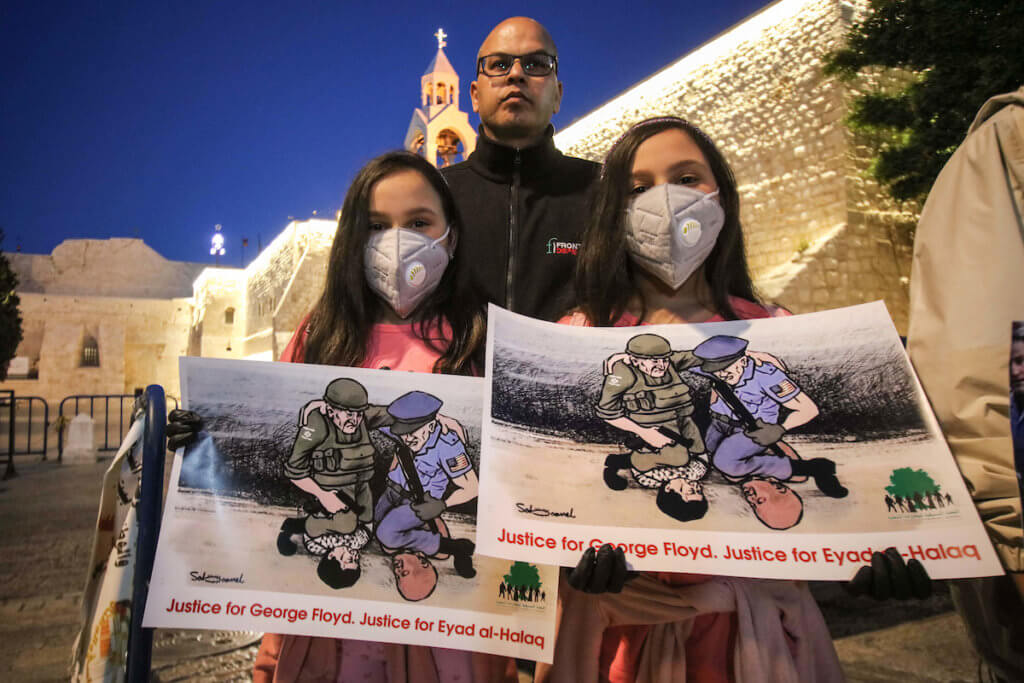
East Jerusalem
Israeli police shot and killed an unarmed Palestinian man at an entrance to the Old City in Jerusalem, claiming they thought he had a gun. According to his family, their beloved son Eyad Rawhi al-Hallaq, 32, had the mental age of a 6-year-old due to autism. He was going to his special needs school when he was killed. From CNN.
This opinion piece by Jonathan Cook examines the similarities between the racism underlying events in Jerusalem and Minneapolis. He notes the parallels in dehumanization and use of force in civilian murders, and specifically notes the influence of Israel’s policing methods and paramilitary Border Police. From the Middle East Eye.
West Bank
Israeli border police shot and killed Ahmad Erakat, 27, at a West Bank checkpoint. The Israelis claimed he had tried to run over an Israeli officer. Video footage shows his car suddenly veering in the direction of the soldiers’ station and crashing into it, lightly inuring one of the soldiers. He is seen getting out of the car, seemingly disoriented and then immediately being shot. He was left on the ground bleeding for over an hour; Israeli officers refused to give him medical treatment, they prevented Palestinian bystanders from doing so, and they prevented Red Crescent ambulances from reaching him. Family maintain that he might have lost control of his car and crashed unintentionally; it is unimaginable that he would have been trying to attack the checkpoint deliberately, as it was his sister’s wedding day. His uncle labeled the death an execution. On the night of his sister’s wedding, Erekat was driving a rental car to pick up his mother and sisters in Bethlehem. His own wedding was scheduled to occur in the coming weeks. From Al Jazeera.
This commentary on the draconian Israeli military court system and dehumanization of Palestinians focuses on the tragedy of Abu Zeyad, a Palestinian campaigner for Amnesty International. Forbidden to leave the West Bank, he appealed to be allowed to visit his dying mother in an East Jerusalem hospital. A closed hearing which he could not attend banned him from visiting before his mother died of cancer in December. From +972 Magazine.
Thousands of Palestinians participated in a demonstration in Jericho against the proposed Israeli plan to annex large parts of the West Bank from July 1. The protest was organized by the Palestinian Authority (PA) and included the United Nations peace envoy for the Middle East and representatives from China, Russia, European Union, Britain and Jordan. While many Palestinians were stopped by the Israeli forces at checkpoints, thousands of others defied the attempts and joined the protest from different parts of the occupied West Bank.
Israeli’s new coalition government has announced that it will start the process of extending Israeli sovereignty over Jewish settlements and the Jordan Valley in the occupied West Bank from July 1. These actions are consistent with proposals made by Trump in his so called “peace plan”. The proposal has been rejected by the Palestinians. From the Peoples Dispatch.
The Israeli police killing of a Palestinian man with disabilities in Jerusalem last month amounts to an extrajudicial execution, the group Al-Haq stated in an urgent appeal to United Nations human rights experts. A previous UN commission of inquiry found that occupation forces may have committed war crimes and crimes against humanity by using lethal military force against unarmed protesters in Gaza. Those crimes include Israeli snipers intentionally shooting people with disabilities knowing them to be people with disabilities. Israel systematically resorts to excessive use of force, including against Palestinians with disabilities, according to Al-Haq. From the Electronic Intifada.
The violent Israeli encroachment and annexation of Palestinian land is putting the future of the West Bank and its residents in an extremely vulnerable position. Social justice movements in the agricultural sector, like the Union of Agricultural Works Committee, (UAWC) have elevated their struggles to new levels. Key among these endeavors are the protection of natural resources such as land, water, and seeds, and the recognition of multiple forms of Palestinian sovereignty. UAWC and other Palestinian grassroots organizations visit elderly people and pregnant women in mobile clinics, distribute educational and protective supplies, and construct rooftop and urban gardens across diverse communities. From Open Democracy.
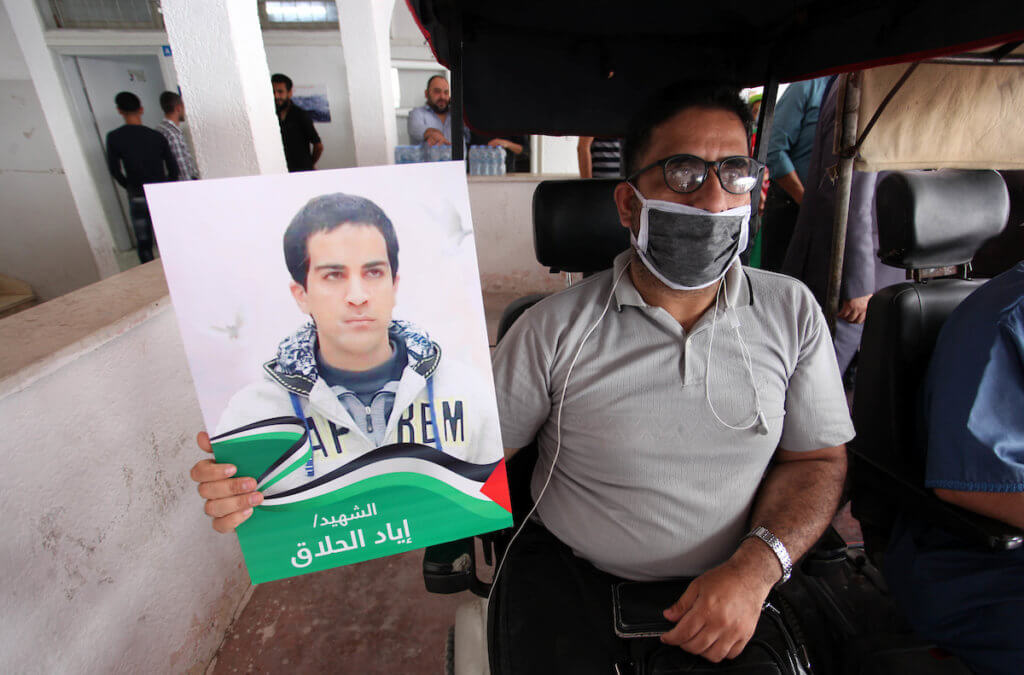
Israel and the occupied Palestinian territory
For some Palestinians, cutting off cooperation with Israel means no medical treatment. Israel requires the Palestinian Authority to apply for a permit for Palestinians from the occupied West Bank and Gaza before they are allowed access essential medical care in Israel, but the PA has stopped applying for them, following the announcement of Israel’s intention to annex parts of the West Bank. Physicians for Human Rights-Israel and the Al Mezan Center for Human Rights have warned that there has been a spike in the number of Palestinian patients who have contacted the organizations for help getting medical treatments. From Haaretz.
The Palestine Authority has stopped processing applications for Palestinians to receive medical care in Israel, and stopped submitting requests for permits from Israel authorities, leading to a sharp decrease in the number of patients allowed to pass the Erez crossing for medical attention. The human rights organization Al Mezan has applied for permits on an individual basis. Al Mezan and Israel Physicians for Human Rights blame both the Palestine Authority for terminating access to medical care and Israel as the ultimate governing authority for failing to ensure such access. From the Lancet
In chilling procedure, soldiers ambush Palestinian laborers, shoot them and break arm of 15-year-old. Since the beginning of May, there have been five incidents in which soldiers lie in wait for Palestinians who are trying to enter Israel for work (without permits) through a gap in the Security Barrier near Far’on, a village south of Tulkarm. In four cases, the soldiers shot the workers. In all five cases, the workers were injured. In one of the cases, the soldiers beat a 15-year-old; they broke his arm and caused abdominal hemorrhaging. Thousands of Palestinian laborers daily have to attempt to enter without permits because Israel has created additional barriers to obtaining them since the start of the COVID-19 pandemic, including reducing the numbers of permits issues and requiring workers to stay in Israel for long periods without being allowed to go home. From B’Tselem.
Three 17-year-old Palestinian young men (Amin Al-Sulaibi, Saifuddin Najajreh, and Khalaf Shakarneh) were taken from their West Bank homes in pre-dawn raids and detained in early June. Their detention was extended until a video court appearance on June 15, when they were released on bail without charges being brought. The detention spanned Tawijhi, the period for secondary schools’ final exams required for graduation. Between August 2019 and February 2020, DCIP documented 120 education-related violations by Israeli forces and settlers in the occupied West Bank and the Gaza Strip, including the detention of children from or near schools and attacks against schools. Israel is the only country in the world that automatically and systematically prosecutes children in military courts that lack fundamental fair trial rights and protections. Israel prosecutes between 500 and 700 Palestinian children in military courts each year. From the Defense of Children International Palestine.
Palestinians and African Americans have been building bridges to create a social movement, without borders, to fight systemic racism. As part of international protests, in Palestine/Israel signs read “Justice for Eyad. Justice for George.” Another says, “Black lives MATTER. Palestinian lives MATTER.” Another “From the Old City to the Twin Cities.” From Mondoweiss.
Activists, scholars and journalists call on the International Criminal Court to rule now to the matter of jurisdiction to prosecute Israeli war crimes against Palestinians and Hamas war crimes against Gazans. “The Prosecution has carefully considered the observations of the participants and remains of the view that the court has jurisdiction over the Occupied Palestinian Territory.” From Mondoweiss.
Only after a query from Haaretz did the army’s top brass learn of the cover-up of vandalism in a Nablus refugee camp by vengeful fighters from an elite Golani unit, in February 2018. From Haaretz.
A violent political context not only generates psychiatric patients, but also creates easier victims out of them. The reaction to the terrifying killings of people such as Floyd, Younis and al-Hallaq must not be restricted to demanding justice for the victims and their families. Their deaths should fuel a wider struggle against racism, and against police and political violence. From Middle East Eye.
Israel
Israel’s Citizenship Law, enacted in 2003, was again extended by the Knesset Foreign Affairs and Defense Committee on June 1. The law preventing Palestinians from entering Israel for family reunification is, according to legal advocacy group Adalah, “a racist violation of fundamental constitutional rights – the right to equality and the right to family.” From Adalah.
Addameer Prisoner Support and Human Rights Association lawyer Samer Samaan reported on a prison visit with Fadwa Hamadah and Jihan Hasimeh at al-Jalameh prison as the two women continued to be held in isolation after two weeks. Their punishment of 21 days in isolation resulted from an issue concerning prison conditions. Under current conditions, they are being held under surveillance in a cramped, dark, dirty, cold, cell with no access to showers, recreation time, medication, or family visits. From Addameer.
Addameer and Palestinian Human Rights (LPHR) lawyers announced that 22-year-old Shatha Hasan, head of Birzeit University’s Student Union’s Council in the West Bank, was freed from Israeli military administrative detention on May 21. Ms. Hasan was taken from her home in a 2 a.m. raid on December 12, 2019, and held for more than five months without charges or trial. Her detention in two prisons in Israeli territory was a breach of the Fourth Geneva Convention. From Addameer.
How Israel exploits gender roles to discredit Palestinian female activists. Imprisoned Palestinian women are derided for neglecting their ‘traditional’ role and denied psychological care. From Middle East Eye.
Palestinian citizens of Israel protest to save Jaffa cemetery. Al-Isaaf cemetery, built almost 200 years ago, holds the tombs of hundreds of Palestinians – but is now under threat of demolition. Palestinian residents of the coastal town of Jaffa are protesting against Israeli plans to raze the nearly 200-year-old Muslim cemetery in order to build a homeless shelter in its place. From Middle East Eye.
The knee that choked George Floyd is part of the same oppressive force that walked away from Ayman Safiah and that pulled the trigger on Eyad al-Hallaq. During the same week that George Floyd was murdered in Minneapolis by a police officer’s knee, Ayman Safiah, a dancer from Kufr Yassif in northern Israel drowned in the Mediterranean after saving a friend who was struggling in the water. It took three days for Israeli police to find his body, because the authorities only made weak attempts to search. After family and friends expressed their outrage on social media, a more thorough search was conducted days after the accident. A week later, in Jerusalem’s Old City, police shot dead Eyad al-Hallaq, an autistic Palestinian young man, claiming he had made “suspicious movements” and was holding what appeared to be a weapon. No weapon was found; he was shot twice in the chest. These are not isolated incidents, nor are they the only ones that happened this month. In Israel and the OPT, only certain lives matter, apparently. From +972 Magazine.
· Amnesty International is challenging a travel ban that the Israeli government imposed on its campaigner for Israel and Palestine, Laith Abu Zeyad. Abu Zeyad, who is a Palestinian from the West Bank, must obtain an Israeli-issued permit to enter significant parts of the West Bank under Israeli control, including East Jerusalem, and Israel itself. According to B’Tselem, the Israeli rights group, the permitting system is “arbitrary, entirely non-transparent bureaucratic system.” Israeli authorities denied Abu Zeyad a permit last September to enter occupied East Jerusalem, where he had hoped to accompany his mother, who needed cancer treatment, to a hospital just three kilometers from his home but on the other side of the separation barrier. She died there in December without her son by her side. From Human Rights Watch and Al Jazeera.
Expressing themselves in uncharacteristically candid fashion, three former Mossad chiefs have publicly conceded that political assassinations are of dubious strategic value. From Middle East Eye.
International
On World Refugee Day (June 20), more than a fifth of all people with this legal status worldwide, according to the UN Relief and Works Agency (UNRWA). At least 5.6 million Palestinians receive UNRWA support services for refugees.
The origin of the diaspora of this Arab people began in 1948 when the creation of the State of Israel expelled hundreds of thousands of Palestinians from their homes. The descendants of those first displaced people continue today fighting for the right to return to their homeland. In addition to surviving under the harsh conditions experienced by displaced persons, Palestinians are currently facing serious health risks. UNRWA warned of several factors that make Palestinian refugees one of the most vulnerable populations to COVID-19. From Telesur English.
United States
Officers from the U.S. police force responsible for the killing of George Floyd received training in restraint techniques and anti-terror tactics from Israeli law enforcement officers. At least 100 Minnesota police officers attended a 2012 conference hosted by Israel’s Chicago consulate, the second time such an event had been held. There, they learned the violent techniques used by Israeli forces as they terrorize the occupied Palestinian territories under the guise of security operations. The so-called counter terrorism training conference in Minneapolis was jointly hosted by the FBI. From Peoples World.
The International Criminal Court is considering examining widespread human rights abuses perpetrated by U.S. soldiers in Afghanistan, and crimes committed by Israeli soldiers in the occupied Palestinian territories, especially Gaza, as well as the officials responsible for Israel’s illegal settlement program. Trump announced sanctions against the ICC officials investigating abuses stressing that the Hague-based tribunal has no “jurisdiction over personnel of the United States and certain of its allies”. An executive order signed by Trump freezes any assets of targeted ICC investigators in the U.S. and bans them and their immediate family members from entering the country. The decree does not mention Israel by name, but repeatedly states that the sanctions aim to protect U.S. “allies” that are not party to the Rome Statute that established the court in 1998. Israel and the United States are two of the few countries that rejected the founding of the court, while 123 countries have agreed to its mandate. From Middle East Eye, Mondoweiss.
More than 50 Members of Congress signed a public letter calling on Trump’s ambassador to Israel, David Friedman, to denounce violence committed by Israeli settlers against Palestinian civilians in the West Bank, in the same manner that he condemns violence committed by Palestinians against Israelis. From Haaretz.
UNRWA
Ministerial Pledging Conference: This week 75 governments and non-governmental organizations pledged $130 million in support of UNRWA and Palestine refugees at an Extraordinary Virtual Ministerial Conference convened by Jordan and Sweden. This funding is an important step forward to help UNRWA implement fully its UN General Assembly mandate. At the conference UN Secretary-General Guterres made a point to personally participate, noting the world shares a collective responsibility to Palestine refugees “until the realization of a just and viable political solution to the Israeli-Palestinian conflict.” Ayman Safadi, Minister of Foreign Affairs of Expatriates of Jordan, told the conference, “This is a time for action. Supporting UNRWA is a necessary action. The agency has done all it could to ensure efficiency and effectiveness in its operations. We must stand by it.”
UNRWA 2019 Annual Operations Report: UNRWA released this week its 2019 Annual Operations Report, which provides a holistic review of UNRWA’s 2019 operations.
Human rights hero of the month: the Palestinian BDS National Committee
The BNC has come out with unwavering support for black organizations in the United States and Black Lives Matter. There is great intersectionality between Palestinians and the Black Lives Matter movement in the U.S. After the killing of George Floyd, the Palestinian BNC made a statement of solidarity with Black Lives Matter. They stated, “We can’t breathe until we’re free from oppression and racism. Your resilience in the face of brutal dehumanization is a source of inspiration to our own struggle against Israel’s regime of occupation settler colonialism and apartheid. We support calls such as this initiative from Minneapolis organizers to divest from militarism, policing and instead invest in community led health and safety.
